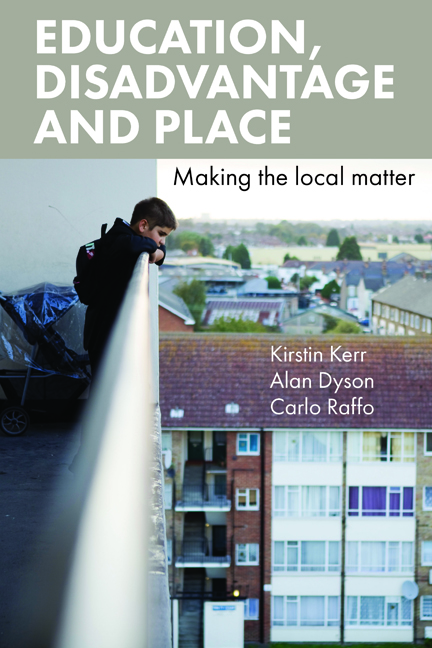Book contents
- Frontmatter
- Contents
- List of tables and figures
- Notes on authors
- Acknowledgements
- one Introduction
- two Why place matters in education
- three Local education systems as products of place: a case study
- four Learning from the past
- five Learning from the present
- six A rationale for a new generation of area-based initiatives
- seven Developing understandings of place as a basis for intervention
- eight Evaluation and monitoring
- nine Governance and accountability
- ten Children and places in hard times: some concluding thoughts
- References
- Index
four - Learning from the past
Published online by Cambridge University Press: 25 February 2022
- Frontmatter
- Contents
- List of tables and figures
- Notes on authors
- Acknowledgements
- one Introduction
- two Why place matters in education
- three Local education systems as products of place: a case study
- four Learning from the past
- five Learning from the present
- six A rationale for a new generation of area-based initiatives
- seven Developing understandings of place as a basis for intervention
- eight Evaluation and monitoring
- nine Governance and accountability
- ten Children and places in hard times: some concluding thoughts
- References
- Index
Summary
The previous chapters have begun to explore how we might better understand the relationships between education, disadvantage and place, with a view to intervening in them through area initiatives. However, as we suggested in Chapter One, there is a long history of area-based initiatives (ABIs) – and, indeed, there have been overlapping generations of different kinds of ABIs – though it is not entirely clear that these have all been based on the kind of complex understanding that we are advocating. In this chapter, therefore, we wish to review that history, paying particular attention to what, in Chapter One, we very broadly termed ‘traditional’ first- and second-generation ABIs.
We focus on England, where the history of area initiatives of all kinds is particularly rich, and where, during the New Labour years between 1997 and 2010, they played a major role in policy efforts to tackle educational disadvantage. We begin by exploring a range of ABIs before focusing more particularly on those with a significant educational component. Our aim is not to give a comprehensive account of the history, but to extract from it the key lessons that can be learned in order to inform the development of ABIs in the future.
The evolution of area-based initiatives in England
In England, ABIs have typically been conceptualised as a way for central government to target resources and energies into those parts of town and cities where disadvantage is most acutely concentrated. Such ABIs are generally seen as of relatively recent origin, beginning with the Urban Programme of the 1960s. As Dargan (2007, p 346) explains:
Based on the assumption that poverty and deprivation existed in isolated pockets within the inner cities, the Wilson government introduced the Urban Programme; a discrete package of funding, separate from mainstream programmes, to be targeted at specific urban areas in an effort to eradicate deprivation.
Importantly, as a discrete, separate, specifically targeted programme, the Urban Programme was designed to ‘stand alone’ – a design trait that Batty et al (2010) note still endured in the 2000s. As they reflect:
For more than 40 years, UK governments have attempted to moderate disadvantage within deprived pockets of English cities and larger towns, through the designation of ABIs such as the Urban Programme, Urban Development Corporations, City Challenge and the Single Regeneration Budget.
- Type
- Chapter
- Information
- Education, Disadvantage and PlaceMaking the Local Matter, pp. 65 - 88Publisher: Bristol University PressPrint publication year: 2014



